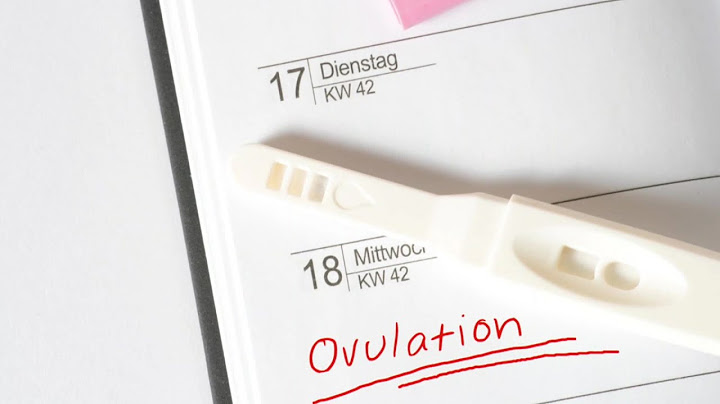Maybe you can’t wait to have a baby. Or maybe that’s the last thing you’re hoping for. Show
Cleveland Clinic is a non-profit academic medical center. Advertising on our site helps support our mission. We do not endorse non-Cleveland Clinic products or services. Policy Either way, if you think you might be pregnant, you need to know for sure. But what are the odds a positive pregnancy test might be wrong? “Home urine pregnancy tests are pretty reliable,” says Ob/Gyn Jonathan Emery, MD. “But there are some reasons you might get a false-positive result.” Dr. Emery explains when and why a pregnancy test might give a false positive — and what you can do to make sure the stick doesn’t lie. How do pregnancy tests work?When you get pregnant, your body produces a hormone called human chorionic gonadotropin, or hCG. Home pregnancy tests look for that hormone in your urine. If hCG is present, you should get a positive test result when you pee on a stick. But hCG levels start out very low and increase over time. If you take the test too soon after conceiving, it might say you’re not pregnant when you really are. In other words, timing can lead to a false negative. But what about a false positive? False positives aren’t super common, Dr. Emery says. But they’re not impossible. Some potential causes include: Early miscarriage or chemical pregnancyYou took a pregnancy test and got two lines. (Positive!) But a few days later, your period arrived in force. What gives? The most common reason this happens is an early pregnancy loss, also known as a chemical pregnancy. In this case, the test was accurate — there was a pregnancy, but it wasn’t a viable one, Dr. Emery explains. “It’s not technically false since a very early pregnancy did occur,” he says. “But this is the most common reason that a pregnancy test might appear to have been false.” Fertility medications“A lot of fertility treatments involve taking hCG injections,” Dr. Emery says. If you’ve been taking fertility medications, that hCG might still be floating around your system. That could trigger a positive pregnancy test, even if you’re not pregnant. To avoid that mix-up, wait at least two weeks after your last hCG injection to take a home pregnancy test, he says. Recent pregnancyIf you were recently pregnant, you might still have leftover hCG in your system. After childbirth, miscarriage or treatment for ectopic pregnancy, the hormone can remain in your body for up to four to six weeks, Dr. Emery says. “That could lead to a positive pregnancy test when your body just hasn’t cleared the hCG yet.” User errorHome pregnancy tests aren’t especially hard to use. But you still have to pay attention since a mistake can lead to incorrect results. If you wait too long to read the results, for example, or use more drops of urine than the test calls for? You might want to take the answer with a grain of salt. “If you don’t follow all the instructions, any results — positive or negative — could be false,” Dr. Emery says. Pregnancy test accuracy: How to get results you can trustLuckily, false positives are rare. And there are steps you can take to make sure your home pregnancy test gives you results you can trust.
Home pregnancy tests are inexpensive, private and quite reliable, Dr. Emery adds. “People often don’t believe what they’re seeing. But if you’ve used the test correctly and done it at the right time, it’s probably true.” There are two types of pregnancy tests; one uses a urine sample, the other a sample of blood. Both pregnancy tests detect the presence of a hormone called human chorionic gonadotropin (hCG). This hormone is produced by the placenta shortly after the embryo attaches to the uterine lining and builds up rapidly in your body in the first few days of pregnancy. It is this rapid shift in hormones that trigger most of your pregnancy symptoms. Types of Pregnancy TestsUrine TestsUrine tests can be performed in two different ways and these can be performed at home or in a clinic. One way involves collecting your urine in a cup and dipping a stick into the urine or putting urine into a special container with an eyedropper. Another option involves placing a stick into your urine stream and catching your urine in midstream. Tests vary in how long you have to wait to get a result. You will be looking for a change in color, a line, or a symbol (like a plus or minus). The newer digital pregnancy test offered by Clearblue Easy makes reading your results simple: the window will either show the words “not pregnant” or “pregnant”. All tests come with instructions, and it is important that you follow these instructions to get an accurate reading. How soon can I take a urine test?Most doctors recommend that you wait until the first day of your missed period before taking a urine pregnancy test. This is usually about two weeks after conception. However, some tests are more sensitive than others and can be taken earlier. How accurate are urine tests?Urine tests or home pregnancy tests are around 97% accurate when done correctly. Home pregnancy tests are great to use because they can be done at home, they are usually low in cost (anywhere from $7.99 to $19.99), private, they give a fast result, and are easy to use. However, if done incorrectly or taken too early, the result can be inaccurate. If you get a negative result and still have symptoms of pregnancy (missed period, nausea, breast tenderness, and fatigue), wait a week and take another test or contact your doctor so you can have a blood test done. Blood TestsThere are two types of blood tests. A quantitative blood test measures the exact amount of hCG in the blood, and a qualitative hCG blood test gives a simple yes or no answer to whether you are pregnant or not. Advantages of having a blood test done:
Disadvantages of having a blood test done:
Frequently Asked Questions About Pregnancy TestsIf I get a positive result on a home pregnancy test, does that mean I am pregnant?A positive result from a home pregnancy test shows the presence of the hormone hCG in your system. When an egg is implanted in a woman’s uterine lining, hCG hormones begin to develop and multiply. This is a sign that you have become pregnant. If I get a negative result on a home pregnancy test, does that mean I am not pregnant?A negative result can mean that you are not pregnant, you took the test too early, or you took the test wrong. Pregnancy tests vary in their sensitivity (how soon they can detect the hormone hCG), and you may not have given your body enough time to produce enough hCG hormones that will show up on the test. Also, if you let a test sit for too long (after the instructions on the box tell you), the test is invalid. It is best to follow the instructions and wait until you have missed a period before taking the test. Most pregnancy tests come with two in a box, and it is a good idea to take both. How soon can I take a home pregnancy test?It is recommended that you wait until you have missed a period to take a home test. A missed period is often one of the first signs of pregnancy. If you cannot wait that long to find out and you know the day you may have conceived, then the earliest you can take a test would be 14 days from possible conception. What if I take a couple of home pregnancy tests and get different answers?If you have received different answers on multiple pregnancy tests, it is recommended that you get a blood test done to get an accurate answer. Want to Know More?
Compiled using information from the following sources: 1. MedlinePlus [Internet]. Bethesda (MD): National Library of Medicine (US); Prenatal Testing. https://www.nlm.nih.gov 2. U.S. Department of Health and Human Services Why is my pregnancy blood test positive but urine negative?It happens when the woman has very high levels of pregnancy hormones in her blood or urine. The antibodies that pregnancy tests use become overwhelmed and fail to bind to the hormone. Due to this, the result comes back negative.
Can a urine test be negative and blood test positive?Blood Pregnancy Test Accuracy
As with home urine tests, it is possible (although rare) to end up with false results (both negative and positive) from a blood pregnancy test.
Can hCG show up in blood but not urine?The pregnancy hormone (hCG) is not only present in the blood but is also found in the urine of pregnant women. Urine hCG qualitative tests are similar to hCG qualitative blood test, except that it does not require blood or serum.
Can you still be pregnant with a negative urine test?Is it possible to be pregnant and get a negative pregnancy test result? Yes, it is possible. Getting a negative result doesn't mean you're not pregnant, it may just mean your hCG levels are not high enough for the test to detect the hormone in your urine.
|

Related Posts
Advertising
LATEST NEWS
Advertising
Populer
Advertising
About

Copyright © 2024 ihoctot Inc.


















